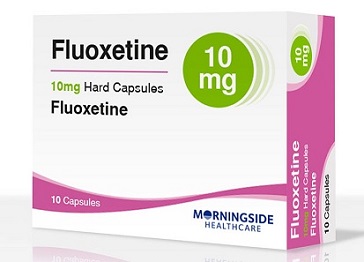University of California And Stanford Study Shows SSRI Antidepressants Like Fluoxetine Or Fluvoxamine Lowers Risk Of COVID-19 Mortality
Source: COVID-19 Drugs Nov 16, 2021 3 years, 4 months, 3 weeks, 6 days, 14 hours, 50 minutes ago
COVID-19 Drugs: University of California-San Francisco and Stanford University researchers have in a new study involving the meta-analysis of health records from 87 health care centers across America found that individuals taking a class of antidepressants called selective serotonin reuptake inhibitors (SSRIs), especially Fluoxetine or Fluvoxamine were significantly less likely to die of COVID-19 than a matched control group.

Antidepressant use may be associated with reduced levels of several proinflammatory cytokines suggested to be involved with the development of severe COVID-19. An association between the use of selective serotonin reuptake inhibitors (SSRIs) specifically fluoxetine hydrochloride and fluvoxamine maleate with decreased mortality among patients with COVID-19 has been reported in recent studies; however, these studies had limited power due to their small size.
https://www.thailandmedical.news/news/the-together-randomized-clinical-trials-shows-that-fluvoxamine-reduces-risk-of-covid-19-disease-severity-and-reduces-need-for-hospitalization
https://www.thailandmedical.news/news/breaking-randomized-clinical-trial-findings-confirms-that-early-treatment-with-fluvoxamine-reduces-risk-of-covid-19-severity-and-mortality
https://www.thailandmedical.news/news/breaking-fluvoxamine-an-inexpensive-anti-depressant-emerging-as-a-leading-drug-candidate-to-be-repurposed-to-treat-covid-19
In this multicenter cohort study analyzing electronic health records of 83 584 patients diagnosed with COVID-19, including 3401 patients who were prescribed SSRIs, a reduced relative risk of mortality was found to be associated with the use of SSRIs specifically fluoxetine compared with patients who were not prescribed SSRIs.
A total of 3401 adult patients with COVID-19 prescribed SSRIs (2033 women [59.8%]; mean [SD] age, 63.8 [18.1] years) were identified, with 470 receiving fluoxetine only (280 women [59.6%]; mean [SD] age, 58.5 [18.1] years), 481 receiving fluoxetine or fluvoxamine (285 women [59.3%]; mean [SD] age, 58.7 [18.0] years), and 2898 receiving other SSRIs (1733 women [59.8%]; mean [SD] age, 64.7 [18.0] years) within a defined time frame. When compared with matched untreated control patients, relative risk (RR) of mortality was reduced among patients prescribed any SSRI (497 of 3401 [14.6%] vs 1130 of 6802 [16.6%]; RR, 0.92 [95% CI, 0.85-0.99]; adjusted P = .03); fluoxetine (46 of 470 [9.8%] vs 937 of 7050 [13.3%]; RR, 0.72 [95% CI, 0.54-0.97]; adjusted P = .03); and fluoxetine or fluvoxamine (48 of 481 [10.0%] vs 956 of 7215 [13.3%]; RR, 0.74 [95% CI, 0.55-0.99]; adjusted P = .04). The association between receiving any SSRI that is not fluoxetine or fluvoxamine and risk of death was not statistically significant (447 of 2898 [15.4%] vs 1474 of 8694 [17.0%]; RR, 0.92 [95% CI, 0.84-1.00]; adjusted
P = .06).
The study findings support evidence that SSRIs may be associated with reduced severity of COVID-19 reflected in the reduced RR of mortality. Further research and randomized clinical trials are needed to elucidate the effect of SSRIs generally, or more specifically of fluoxetine and fluvoxamine, on the severity of COVID-19 outcomes.
The study findings were published in the peer reviewed journal: JAMA Network Open.
https://jamanetwork.com/journals/jamanetworkopen/fullarticle/2786136
The study findings add to a body of evidence indicating that SSRIs may have beneficial effects against the worst symptoms of COVID-19, although large randomized clinical trials are needed to prove this.
Co-researcher Dr Marina Sirota, Ph.D., associate professor of pediatrics and a member of the Bakar Computational Health Sciences Institute (BCHSI) at University of California-San Francisco told Thailand Medical News, "We can't tell if the drugs are causing these effects, but the statistical analysis is showing significant association. There's power in the numbers."
The
COVID-19 Drugs study team analyzed electronic health records from the Cerner Real World COVID-19 de-identified database, which had information from almost 500,000 patients across the U.S. This included 83,584 adult patients diagnosed with COVID-19 between January and September, 2020. Of those, 3,401 patients were prescribed SSRIs.
Importantly the large size of the dataset enabled the study team to compare the outcomes of patients with COVID-19 on SSRIs to a matched set of patients with COVID-19 who were not taking them, thus teasing out the effects of age, sex, race, ethnicity, and comorbidities associated with severe COVID-19, such as diabetes and heart disease, as well as the other medications the patients were taking.
The study findings showed that patients taking fluoxetine were 28 percent less likely to die; those taking either fluoxetine or another SSRI called fluvoxamine were 26 percent less likely to die; and the entire group of patients taking any kind of SSRI was 8 percent less likely to die than the matched patient controls.
Although the effects are smaller than those found in recent clinical trials of new antivirals developed by Pfizer and Merck, the study team said more treatment options are still needed to help bring the pandemic to an end.
Co-researcher Dr Tomiko Oskotsky, MD, a research scientist in Sirota's lab at Bakar Computational Health Sciences Institute (BCHSI) at the University of California, San Francisco added, "The study findings are encouraging. It's important to find as many options as possible for treating any condition. A particular drug or treatment may not work or be well tolerated by everyone. Data from electronic medical records allow us to quickly look into existing drugs that could be repurposed for treating COVID-19 or other conditions."
For the latest on
COVID-19 Drugs, keep on logging to Thailand Medical News.
